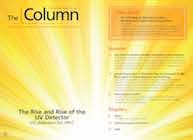Linda McGown Receives EAS Award for Outstanding Achievements in the Fields of Analytical Chemistry
The EAS Award for Outstanding Achievements in the Fields of Analytical Chemistry was presented to Linda B. McGown at EAS on 14 November.
The EAS Award for Outstanding Achievements in the Fields of Analytical Chemistry was presented to Linda B. McGown at EAS on 14 November. McGown is the William Weightman Walker professor of the Department of Chemistry and Chemical Biology at Rensselaer Polytechnic Institute (Troy, New York, USA). In her early career, McGown exploited the capabilities of frequency-domain fluorescence lifetime spectroscopy to create multidimensional data formats to characterize and classify complex samples such as human serum, humic substances, and petrolatums. She then integrated fluorescence lifetime detection into separation techniques. In the 1990s, McGown took an interest in aptamers. Her current work focuses on genomeâinspired approaches to aptamer discovery to complement combinatorial methods, to explore a naturally evolved sequence space often underrepresented in combinatorial libraries. McGown has been a Fellow of the American Association for the Advancement of Science since 200 and received the New York Section of the Society for Applied Spectroscopy Gold Medal Award in 2004. She was included in The Future of Women in Chemistry and Science programme in honour of UNESCO’s declaring 2011 the International Year of Chemistry. She was one of “60 exemplary thinkers” who spoke about how to expand women’s leadership in the sciences, across all disciplines and sectors.

Regulatory Deadlines and Supply Chain Challenges Take Center Stage in Nitrosamine Discussion
April 10th 2025During an LCGC International peer exchange, Aloka Srinivasan, Mayank Bhanti, and Amber Burch discussed the regulatory deadlines and supply chain challenges that come with nitrosamine analysis.









